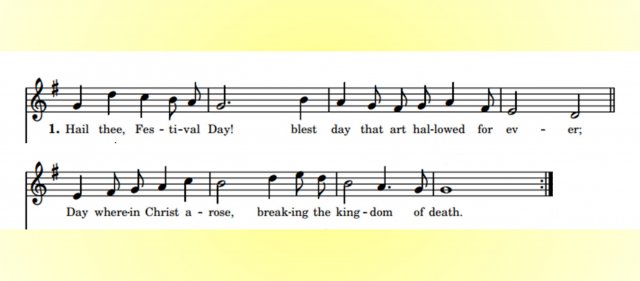That will be our opening hymn this morning, and it's one of my favorites.
Happy Easter to all!
Permalink | Read 826 times | Comments (0)
Category Inspiration: [first] [previous] [next] [newest]
High Flight
Oh! I have slipped the surly bonds of Earth
And danced the skies on laughter-silvered wings;
Sunward I’ve climbed, and joined the tumbling mirth
of sun-split clouds, — and done a hundred things
You have not dreamed of — wheeled and soared and swung
High in the sunlit silence. Hov’ring there,
I’ve chased the shouting wind along, and flung
My eager craft through footless halls of air....
Up, up the long, delirious, burning blue
I’ve topped the wind-swept heights with easy grace.
Where never lark or even eagle flew —
And, while with silent lifting mind I’ve trod
The high untrespassed sanctity of space,
Put out my hand, and touched the face of God.
—John Gillespie Magee, Jr.
Permalink | Read 785 times | Comments (0)
Category Inspiration: [first] [previous] [next] [newest]
Having overheard someone questioning why Coventry Carol was included in our church's Lessons and Carols service earlier this month, I knew it was time to reprise our story of why this song of immeasurable grief belongs in this season of festive joy.
Coventry Carol is an ancient song that tells a story almost as old as Christmas. The events take place sometime after the birth of Christ—after the arrival of the Wise Men, from whom King Herod learns of the birth of a potential rival, and decides to do what kings were wont to do to rivals: kill him. Don't know which baby boy is the threat? No problem, just kill them all.
This song is a lament, a lullaby of the mothers of Bethlehem, whose baby boys would be killed in what came to be called the Massacre of the Innocents. (Jesus escaped, Joseph having been warned in a dream to get out of Dodge; the others are considered the first Christian martyrs—people whose association with Jesus led to their deaths.)
Lully, lullay, Thou little tiny Child,
Bye, bye, lully, lullay.
Lullay, thou little tiny Child,
Bye, bye, lully, lullay.
O sisters two, how may we do,
For to preserve this day
This poor youngling for whom we do sing
Bye, bye, lully, lullay.
Herod, the king, in his raging,
Charged he hath this day
His men of might, in his own sight,
All young children to slay.
That woe is me, poor Child for Thee!
And ever mourn and may,
For thy parting neither say nor sing,
Bye, bye, lully, lullay
Why sing such a gloomy song at Christmas?
Several reasons, maybe. Chief of which is that the Christian Christmas is not like the secular Christmas. It is, indeed, "tidings of great joy," but it is complicated, messy, profound, anything but simplistic and lighthearted. It breaks into the midst of a broken world, and even Jesus' escape from death here is only a short reprieve. There's more to Christmas than the joy of new birth, or even "peace on earth, good will to men." We have to tell the whole story.
Twenty years ago, as the world was beginning in earnest to "ring out the tidings of good cheer," our firstborn daughter gave birth to our first grandchild.
Isaac lived two days.
It was in that season of unspeakable grief that the haunting Coventry Carol touched me as none other could. Frankly, I could not handle all the happy songs about a newborn baby boy; with Coventry Carol I felt merged into an ancient and universal grief, the grief that made Christmas necessary.
Until the Day when all is set right, there will be pain and grief that won't go away just because the calendar says it's December. The last few years, especially, have wounded us all and broken not a few. This reminder that the First Christmas was not a facile Peace on Earth and Joy to the World, and that the first Christian martyrs were Jewish children, is for all whose pain threatens to overwhelm them.
Blessed are they that mourn: for they shall be comforted.
Permalink | Read 1125 times | Comments (4)
Category Children & Family Issues: [first] [previous] [next] [newest] Everyday Life: [first] [previous] [next] [newest] Music: [first] [previous] [next] [newest] Inspiration: [first] [previous] [next] [newest]
A long time ago, Pontius Pilate famously asked, "What is truth?"
More recently, Elon Musk questioned, "What is the value of truth?"
I find Chick-fil-A's Evergreen Hills stories a much-needed breath of sanity in today's world. This year's is The Snow Globe, but I've put them in chronological order below, in case you missed any. The first three are each two minutes long, the new one just over seven.
If your spirits need lifting today, I hope you enjoy these. They're not going to change the world, but the most powerful forces on earth start small.
That's Christmas.
Permalink | Read 1037 times | Comments (1)
Category Inspiration: [first] [previous] [next] [newest]
YouTube is not exactly reliable when it comes to recommending videos for me to watch, but look what showed up in my sidebar tonight:
As most of my readers know, I'm a huge fan of J.R.R. Tolkien's Lord of the Rings books, but not of the movies for a number of reasons. Even though I feel the film story line and characterization are a betrayal of the spirit Tolkien put into his world, I can't deny that there are parts of the movies that are excellent, from the New Zealand setting to the music, and of course I adore this version.
Permalink | Read 874 times | Comments (1)
Category Children & Family Issues: [first] [previous] [next] [newest] Everyday Life: [first] [previous] [next] [newest] Just for Fun: [first] [previous] [next] [newest] Music: [first] [previous] [next] [newest] Inspiration: [first] [previous] [next] [newest]
No, it's not St. Crispin's Day today. I'm a day behind. But I can't wait another year to post one of my favorite scenes from one of my favorite movies: The St. Crispin's Day speech from Kenneth Branagh's Henry V.
Permalink | Read 872 times | Comments (0)
Category Inspiration: [first] [previous] [next] [newest]
A brand-new story is on its way from S. D. Smith, creator of the Green Ember series. There's a trailer at JackZulu.com, and I'm sure more information will follow.
In the meantime, two of the Green Ember books are currently free for Kindle, with more to come next week. But really, the regular Kindle prices are so low, it's not worth stressing of you miss the sales.
In church yesterday, as in many places across the land, veterans in our congregation were asked to stand and be honored.
I'm fine with that—veterans should be honored every day.
But here's something to remind us that Memorial Day is for honoring those military heroes who cannot stand up because they are lying in graves all over the world, having given "the last full measure of devotion."
Here, today, I once again especially remember Porter's granduncles, who each served, fought, and died in France during World War I, as part of the U. S. Army's 101st Machine Gun Battalion.

Harry Gilbert Faulk, of Old Saybrook, Connecticut, son of Olaf Frederick and Hilma Reuterberg Faulk, wounded in action near Chatêau-Thierry, France, July 25, 1918. Died of his wounds later that day.

Hezekiah Scovil Porter, from Higganum, Connecticut, son of Wallace and Florence Wells Porter, killed in action near Chatêau-Thierry, France, July 22, 1918.
The Internet often attributes this to St. Francis of Assisi, but the odds are it's a misattribution. Whoever said it, I like it.
Permalink | Read 1094 times | Comments (1)
Category Inspiration: [first] [previous] [next] [newest]
Amongst the devastating consequences of the Russo-Ukranian War is the disappearance from public eye of the power grab by Canada's Prime Minister Justin Trudeau, and his tyrannical handling of the Freedom Convoy protest in Ottawa.
Actually, a few European politicians did make note of it, calling out Trudeau for his hypocrisy in condemning Russian president Putin while trampling the rights of his own citizens back home. But largely that is yesterday's news.
So today I remember.
This beautiful 14-minute tribute by JB TwoFour (about whom I know nothing but this) bought tears to our eyes as we saw the familiar scenes replayed: the love, the joy, the unity of Canadians in all their diversity, and the support from other nations. Followed, alas, by replacement of the friendly interactions with local law enforcement by an irrational show of force from the government and imported police agencies.
`
(Yes, the misspelling of "Israel" also brought tears to my eyes, but that's just me.)
May history remember the Freedom Convoy as the turning point in Canada's return to sanity, respect for basic human rights, and constitutional protection for its citizens—instead of the minor footnote Prime Minister Trudeau and his supporters are counting on.
Permalink | Read 1133 times | Comments (0)
Category Hurricanes and Such: [first] [previous] [next] [newest] Politics: [first] [previous] [next] [newest] Inspiration: [first] [previous] [next] [newest] Freedom Convoy: [first] [previous] [next] [newest]
Remember 2019? Must have been at least a decade ago, right? Who'd have thought we could pack so much pandemic, riot, and war into two years.
Nonetheless, my post for March 16, 2019 is at least as appropriate now as it was then, so I'm repeating it.
Sandwiched between 3:14 (Pi Day) and 3:17 (St. Patrick's Day) is
3:16 (Greatest Love Day)
John 3:16, that is.
For God so loved the world, that he gave his only begotten Son, that whosoever believeth in him should not perish, but have everlasting life.
In honor of which I present this beautiful anthem, John Stainer's God So Loved the World. No, that's not our choir. But Porter and I have sung this many times and it's one of our favorites.
Permalink | Read 1129 times | Comments (0)
Category Hurricanes and Such: [first] [previous] [next] [newest] Inspiration: [first] [previous] [next] [newest]
This interview with GiveSendGo co-founder, Jacob Wells was so uplifting I have to share it. I'd written about GiveSendGo briefly before, and what little I knew about it induced me to listen to the whole interview, despite it being nearly two hours long. The advantage of unedited interviews is that you get them uncensored; the disadvantage is that they are l-o-n-g. But this one does very well being played at 1.5x speed, as long as you're willing to overlook the fact that it makes everyone sound overly and artificially excited. While there are a couple of places where it is better to be watching, for the most part just listening is fine, so you can exercise, wash the dishes, or drive and enjoy it without feeling guilty.
Those who followed the Freedom Convoy story in Canada will appreciate information about the legal consequences for GiveSendGo of the Canadian government's threat to seize assets without benefit of court order, as well as the malicious hack they suffered and how they have responded. Others might find this tedious, but anyone can enjoy hearing about Wells' early life (he grew up in New Hampshire and has 11 siblings), his adventures testifying in front of a Canadian parlimentary committee, and the reasons why GiveSendGo does not discriminate against people or organizations (including the Church of Satan) as long as the projects involved do not violate a few minimal conditions (such as legality).
Rarely have I seen such a positive integration of a person's business, life, and faith. As I said: uplifting. I hope those of you who have time to listen enjoy it as much as I did.
Permalink | Read 1443 times | Comments (0)
Category Hurricanes and Such: [first] [previous] [next] [newest] Inspiration: [first] [previous] [next] [newest] Freedom Convoy: [first] [previous] [next] [newest]
Milestone note: This is my 3000th blog post. That calls for something serious, but not depressing. Here you go:
Fairy tales ... are not responsible for producing in children fear, or any of the shapes of fear; fairy tales do not give the child the idea of the evil or the ugly; that is in the child already, because it is in the world already. Fairy tales do not give the child his first idea of bogey. What fairy tales give the child is his first clear idea of the possible defeat of bogey. The baby has known the dragon intimately ever since he had an imagination. What the fairy tale provides for him is a St. George to kill the dragon. — G. K. Chesterton, 1909 ("The Red Angel")
Since it is so likely that [children] will meet cruel enemies, let them at least have heard of brave knights and heroic courage. ... Let there be wicked kings and beheadings, battles and dungeons, giants and dragons, and let the villains be soundly killed at the end of the book. — C. S. Lewis, 1952 ("On Three Ways of Writing for Children")
I write stories for courageous kids who know that dragons are real, that they are evil, and that they must be defeated. I don’t do that because I want to hurt children, but because children do and will face hurts every day. I don’t want to expose them to evil, I want to help them become people for whom evil is an enemy to be exposed. I want to tell them dangerous stories so that they themselves will become dangerous—dangerous to the darkness. — S. D. Smith, 2022 ("My Blood for Yours")
Smith's essay in video form (three minutes).
P.S. There's a new Green Ember book to be released soon, Prince Lander and the Dragon War. Time to reread the previous books in preparation!





.png)

